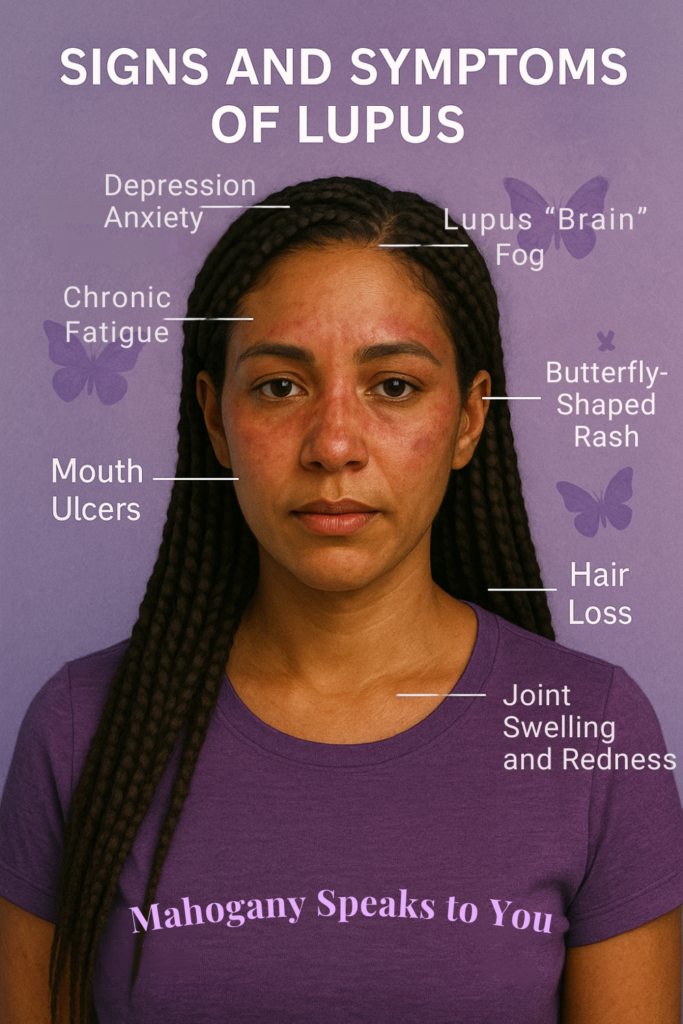
Lupus is a complex autoimmune disease that affects millions worldwide, yet its manifestations are often misunderstood or overlooked. For African American women, the journey with lupus can be particularly challenging, as they are disproportionately affected and frequently face unique hurdles in diagnosis and treatment.
Listen to the Podcast Now! Lupus Unseen: Navigating the Visible and Invisible
The Visible Signs of Lupus

Some lupus symptoms are outwardly apparent and can significantly impact daily life:
- Butterfly Rash: A distinctive red rash across the cheeks and nose, often triggered by sun exposure.
- Skin Lesions: Rashes or sores that may appear or worsen with sunlight.
- Hair Loss: Thinning hair or bald patches, which can affect self-esteem.
- Joint Swelling and Redness: Inflammation that can cause discomfort and limit mobility.
These visible symptoms can lead to emotional distress, as individuals may feel self-conscious or misunderstood.
The Invisible Struggles
Beyond the visible, lupus presents a host of symptoms that aren’t immediately apparent to others:
- Chronic Fatigue: This isn’t just feeling tired; it’s an overwhelming, persistent sense of exhaustion that rest often doesn’t relieve. It can feel like constantly running on empty, making work, social activities, and even basic self-care incredibly difficult.
- Persistent Joint and Muscle Pain: Individuals often experience significant aching, stiffness (especially in the morning), and tenderness in their joints and muscles, frequently without the external signs of redness or swelling that others might expect to see. This pain can migrate, affecting different areas on different days.
- Cognitive Difficulties: Many individuals struggle with frustrating cognitive difficulties, commonly referred to as “lupus fog.” This isn’t a lack of intelligence; it’s a neurological symptom that can manifest as trouble concentrating, memory lapses, difficulty finding the right words, or general mental cloudiness.
- Emotional Impact: Living with a chronic, unpredictable illness like lupus understandably takes a heavy emotional toll. Beyond the stress of managing the condition, there’s an increased risk of developing anxiety and depression, fueled by pain, fatigue, uncertainty about the future, and the impact on one’s identity and lifestyle.
These invisible symptoms can be isolating, as others may not recognize the severity of the individual’s experience.
The Disproportionate Impact on African American Women
African American women are three times more likely to develop lupus than white women and often experience more severe symptoms. Factors contributing to this disparity include genetic predispositions, environmental triggers, and systemic healthcare inequalities. Additionally, experiences of racial discrimination have been linked to increased disease activity and organ damage in Black women with lupus (Vara et. al, 2022).
Several factors contribute to this stark disparity. While genetic predispositions play a role, they do not fully explain the gap. Environmental factors and crucial social determinants of health, including systemic healthcare inequalities, are significant contributors. These inequalities can result in delayed diagnosis, barriers to accessing specialist care and consistent treatment, and implicit bias within the healthcare system.
Furthermore, the chronic stress from lived experiences of racial discrimination acts as a potent physiological trigger. Research consistently links these experiences to increased lupus disease activity and worse long-term outcomes, including organ damage, in Black women (Plantinga et al., Arthritis Care Res, 2012; Drenkard et al., Lupus Sci Med, 2018). Understanding this complex interplay of genetic, environmental, and social factors is essential for addressing lupus disparities and improving health outcomes.
Empowerment Through Advocacy and Support
Living with lupus requires resilience and proactive management:
- Education: Understanding the disease empowers individuals to make informed decisions about their health and well-being.
- Communication: Open dialogue with healthcare providers ensures better care and understanding.
- Support Networks: Connecting with others facing similar challenges can provide emotional support and practical advice.
- Self-Care: Prioritizing rest, nutrition, and mental health is crucial in managing symptoms.
Conclusion
Recognizing both the visible and invisible aspects of lupus is essential in fostering empathy and providing comprehensive support. By raising awareness and advocating for equitable healthcare, we can improve the lives of those affected by this complex disease.
For more insights and personal stories, listen to the full episode of the Rooted Will Rising Advocate Podcast and visit MahoganySpeaksToYou.com.
More from The Rooted Will, Rising Advocate Podcast
More from Mahogany Speaks to You
References
Drenkard, C., Pool, V., Gibofsky, A., Bao, G., Molta, C. T., Sanchez-Guerrero, J., Kamen, D. L., Lim, S. S., Alarcón, G. S., & Fernández-Ávila, D. G. (2018). Perceived discrimination is associated with healthcare utilization and disease activity in African Americans with systemic lupus erythematosus. Lupus Science & Medicine, 5(1), e000249. https://www.google.com/search?q=https://doi.org/10.1136/lupus-2017-000249
Plantinga, L., Lim, S. S., Drenkard, C., Alarcón, G. S., Powell, T. M., Pisu, J. E., McClellan, D. A., Brown, P. M., & Kaslow, R. A. (2012). Association of self-reported racial discrimination with disease activity in African-American patients with systemic lupus erythematosus. Arthritis Care & Research, 64(2), 254–262. https://www.google.com/search?q=https://doi.org/10.1002/acr.20658
Vara EL, Langefeld CD, Wolf BJ, Howard TD, Hawkins GA, Quet Q, Moultrie LH, Quinnette King L, Molano ID, Bray SL, Ueberroth LA, Lim SS, Williams EM, Kamen DL, Ramos PS. Social Factors, Epigenomics and Lupus in African American Women (SELA) Study: protocol for an observational mechanistic study examining the interplay of multiple individual and social factors on lupus outcomes in a health disparity population. Lupus Sci Med. 2022 Jun;9(1):e000698. doi: 10.1136/lupus-2022-000698. PMID: 35768168; PMCID: PMC9244713.